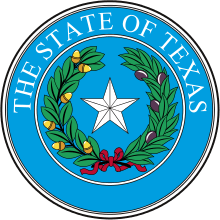Six flags over Texas

"Six flags over Texas" is the slogan used to describe the six countries that have had sovereignty over some or all of the current territory of the U.S. state of Texas: Spain (1519–1821), France (1685–1690), Mexico (1821–1836), the Republic of Texas (1836–1845), the Confederate States of America (1861–1865), and the United States of America (1845–1861; 1865–present).[1] This slogan has been incorporated into shopping malls, theme parks (Six Flags), and other enterprises. The six flags are also shown on the reverse of the Seal of Texas.
In 1997 the Texas Historical Commission adopted standard designs for representing the six flags.[2]
Spain (1519 to 1685; 1690 to 1821)
.svg.png)
.svg.png)
The first flag belonged to Spain, which ruled most of Texas from 1519 to 1821. There were two versions of the Spanish flag used during this period. Both designs incorporate the "castle and lion" emblems of the Crown of Castile (see Flag of Castile and León). The Spanish flag used in the reverse of the Seal of Texas, which was also adopted by the Texas State Historical Commission, is the flag adopted by King Charles III, containing horizontal stripes of red-gold-red and the simple arms of Castile and León. This flag was used by Spain from 1793 to 1931, and from 1936 to the present day (though the current Spanish flag now has a different coat of arms).[3][4]
France (1684 to 1690 for Fort Saint Louis and 1800 to 1803 as French Louisiana)

The second flag was the royal banner of the Kingdom of France from 1684 to 1690. In 1684, French nobleman René-Robert Cavelier, Sieur de La Salle, founded a colony on the Texas Gulf Coast called Fort Saint Louis. The colony was unsuccessful, and after La Salle's murder, was soon abandoned. During this time, there was no official French flag, so a number of designs are used in displays of the "six flags".[3][4]
Later on in 1800, Spain ceded Louisiana to France under the Third Treaty of San Ildefonso. French Louisiana included northern sections of Texas. It remained in the hands of France until 1803, when France sold the Louisiana Territory to the United States. However, what would later be northern Texas was sold back to Spain years later.
Mexico (1821 to 1835)
.svg.png)
The third flag flown (1821 through 1836) was the flag of Mexico. Mexico's independence was recognized by Spain in 1821. The Mexican flag displayed in the Austin Capitol is the one of the Mexican Republic of 1823 through 1864.
This flag was in use in Texas until its independence from Mexico in 1836 (Texas' declaration of independence).[3]
Republic of Texas (1836 to 1845 as the Republic of Texas; 1845-present as the State of Texas)

The fourth flag belonged to the Republic of Texas from 1836 to 1845. The Republic had two national flags during its history, the first being the so-called "Burnet Flag". The "Lone Star Flag", the final national flag, became the state flag when Texas joined the United States as a U.S. state in 1845.[4]
United States of America (1845 to 1861 and 1865 to present)

The fifth and current flag is that of the United States of America, which Texas joined in 1845. Upon secession Texas abandoned this flag for its sixth, until readmission to the Union in 1865.[4]
Confederate States of America (1861 to 1865)
.svg.png)
The sixth flag belonged to the Confederate States of America from 1861 to 1865. During this time, the Confederacy had three national flags.[3][4]
Gallery
-

Display of the Six Flags in Austin, Texas
See also
References
- ↑ "Six Flags of Texas". Texas State Library and Archives Commission. Retrieved September 29, 2013.
- ↑ Texas Historical Commission (June 20, 1997). "Recommended Historic Designs: The "Six Flags Over Texas"". Texas Register. Texas Secretary of State. 22: 5959–67.
- 1 2 3 4 Texas State Library – Six Flags of Texas
- 1 2 3 4 5 The Six National Flags of Texas
External links
- Flags of Texas from the Handbook of Texas Online
- Texas Almanac
- The Portal to Texas History
- Reverse of Texas State Seal
- Six Flags of Texas
- Texas State Preservation Board
- Texas Register (scroll down page to "Six Flags Over Texas" information on pages 5959–5967)
- The Republic of the Rio Grande Museum
- Mexico – Filibustering: Republic of the Rio Grande
- Origin of the Lone Star Flag of Texas
